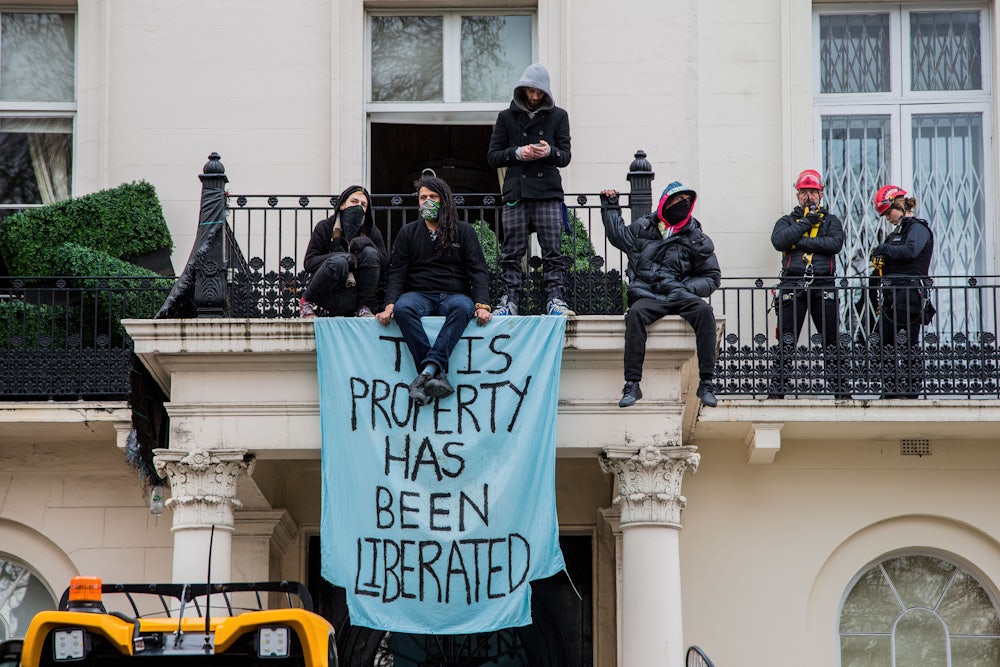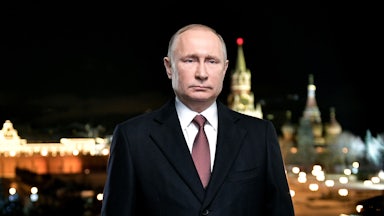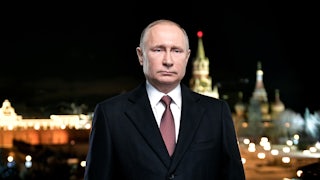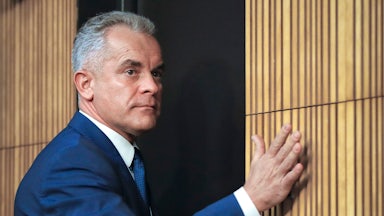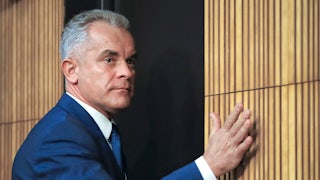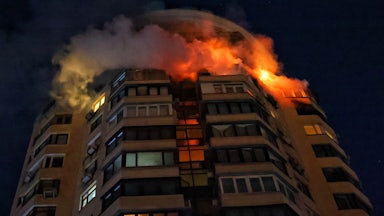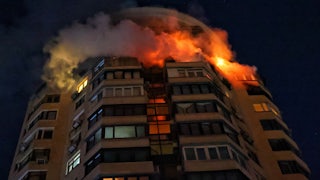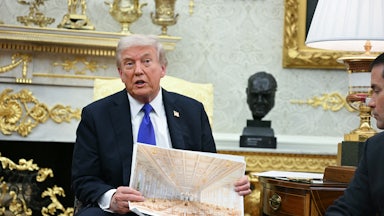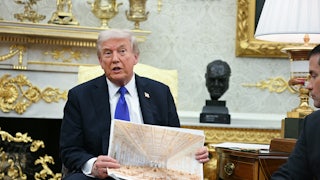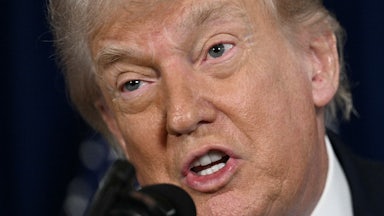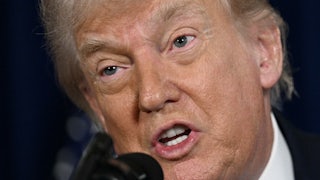Have you ever seen an oligarch? I did, once, three years ago, in Vienna, or at least I’m pretty sure I did. My wife and I were sightseeing in Stephansplatz. We stopped for dinner at the Vienna branch of a rather sumptuous Florentine restaurant. It was the sort of tourist trap—good food but outrageous prices—where people like us go when we’re on vacation, and we’re famished, and our feet hurt, and why not stretch our budget this once?
I spotted him right after we ordered, seated in a corner table to our left. I couldn’t, of course, be certain he was an oligarch, but if he wasn’t it was a brilliant impersonation. Burly guy, maybe 55, sport coat two sizes too small, white loafers with gold tassels, chestnut-brown hairpiece. Beside him sat a slender blonde, a real knockout, maybe 25, so very attentive that I guessed she had the meter running (so to speak). I tried and failed not to stare. Finally I whispered Oligarch! to my wife with a leftward jerk of the head. He shot back an unfriendly look that said, “Mind your own business, приятель.”
The world has oligarchs on the brain because, as the United States and the European Union impose ever more severe financial sanctions on Russia, one of their more telegenic methods is to seize the gaudy assets of Russian oligarchs. Locating oligarchs on the lam has become a sort of video game for the masses. The Washington Post’s Rachel Lerman and Heather Kelly last week reported the advent of social media accounts that follow the movements of oligarchs’ supersize yachts and private jets, “hoping to catch them on the run.” There’s even a hive-mind Oligarch Bingo.
The hope is that, as sanctions ratchet up the pain, the oligarchs will use their leverage to end an invasion that’s increasingly just a large-scale civilian massacre, either by persuading Putin or removing him. That’s pretty unlikely, because the oligarchs lack much power to do either. Granted, more than half of Russia’s wealth resides outside the country. But that doesn’t count the wealth in the ground (oil and gas). And anyway, the cartoon plutocrats parading their riches on the Côte d’Azur wouldn’t be on the Côte d’Azur right now if they still wielded much influence. They’d be in Moscow, and so would most of their cash. Whatever power there is to check Putin remains in Russia, among a harder-to-reach cohort of security personnel called the siloviki.
Still, it takes a heart stonier than mine not to enjoy seeing these kleptocrats scatter like cockroaches.
The oligarchs’ golden age was the 1990s. As the former Washington Post reporter David Hoffman explains in his 2002 book, The Oligarchs: Wealth and Power in the New Russia, when Boris Yeltsin became president in 1991 he
chose to free prices first and property first and to install rules and institutions of a market economy only later. The result was that Russian capitalism was born into an airless space, a vacuum without effective laws and a state so badly weakened it could not enforce laws that were on the books.… Lying, stealing, and cheating were part of daily business, and violence, brutality, and coercion were often tools of the trade.
Russia in the 1990s was a sort of libertarian experiment. What do you get in a market economy when there’s no government? You get oligarchy. The original oligarchs were true oligarchs in the economic sense—six or seven clever and unscrupulous men who, between them, assumed control of pretty much the entire Russian economy, and bent a laughably weak state to their will. They weren’t entrepreneurs, Hoffman writes, because for the most part “they built very little that was new on the ground.… Rather, their first lessons were how to make easy money, which came to them so effortlessly that they seemed to grab it out of thin air.” Later, the term “oligarch” was applied to a larger group of superrich who were much less economically dominant and who exercised much less control over the Russian government.
When Putin succeeded Yeltsin in 1999, the oligarchs lost their power. One of the originals, an oil magnate named Mikhail Khodorkovsky, was jailed for 10 years, declared a prisoner of conscience by Amnesty International, and ultimately was awarded damages by the European Court of Human Rights (though the latter disputed his arrest was politically motivated). Khodorkovsky lives now in London, and this week he called for tougher sanctions against Russia.
Two of the other original oligarchs, Boris Berezovsky and Vladimir Gusinsky, also fell afoul of Putin and left the country. Berezovsky went to England, where in 2013 he was found dead with a ligature around his neck (the coroner pronounced himself uncertain whether he’d been strangled or committed suicide). Gusinsky fled to Gibraltar after being jailed for embezzlement (the European Court of Human Rights judged him innocent) and then released only after he agreed to sell his media company. A fourth member of the original group, a banker named Alexander Smolensky, lowered his profile and reportedly moved to Vienna. (He’s not the guy I saw in the restaurant.) The larger group of oligarchs got the message to steer clear of Putin.
Putin’s oligarch purge wasn’t precisely a housecleaning. He just brought in his own team. Siloviki means “security forces,” but it’s also used more broadly to describe Putin cronies from the KGB and elsewhere whom he made fellow kleptocrats. In other words, they’re oligarchs, too. Unlike Yeltsin’s oligarchs, though, they work for Russia’s president, not the other way round, and more of their cash stays in Russia.
Not all of it, though. Spencer Woodman of the International Consortium of Investigative Journalists—the people who brought you the Panama Papers and the Pandora Papers—has posted a handy guide to some of Putin’s more conspicuous siloviki. A British firm called Tulloch & Co., headed by an attorney named Alastair Tulloch, “structured networks of companies,” Woodman wrote, for a former Russian deputy finance minister named Andrey Vavilov and Alexander Mamut, “a billionaire oligarch and political insider.” A childhood friend of Putin’s named Sergey Roldugin “has shuffled at least $2 billion through banks and offshore companies.” Roldugin is suspected of being the front man either for Putin himself or for other Putin intimates. The European Union froze his assets (or anyway, those it could find) in late February, along with those of several other Putin cronies. Svetlana Krivonogikh, a female janitor and onetime rumored lover of Putin’s whose teenage daughter may be Putin’s daughter, has a reported net worth of at least $14.3 million and owns a $4 million apartment in Monaco, with a Monaco-based financial firm called Moores Rowland as intermediary. The daughter, Luiza Krivonogikh, quit Instagram last week after being harassed with comments like, “Are U sitting in the bunker?? Like a rat?”
Money is fungible, and no doubt oligarchs and siloviki are right now shuffling quite a lot of it to avoid detection. British firms seem to come up a lot in news accounts, but the U.S. real estate market, NBC News reports, is one of the better hidey-holes, and don’t forget South Dakota.
Putin’s kleptocrats are just “footmen,” Khodorkovsky told CNN this week, and “cannot influence him.” But “it is absolutely important to stop all of these purse holders of Putin’s until the war ends,” he said. It’s “the only thing that will stop the war.” Let’s hope it isn’t the only thing, because there’s little reason to believe it will work. But it certainly makes for great sport. Let the games continue.
